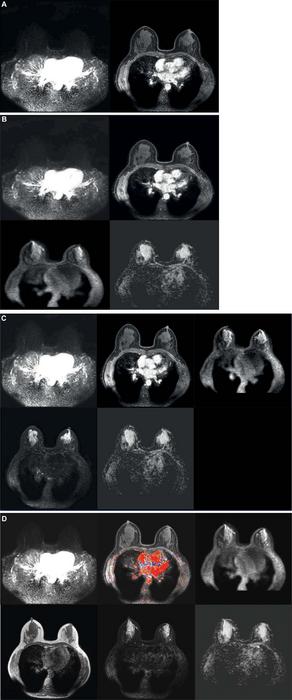The investigative team applied a meticulously designed incremental approach, analyzing a series of MRI sequences that cumulatively build the complete imaging protocol. Initially, the dynamic contrast-enhanced T1-weighted sequences were acquired within the first 120 seconds post-contrast injection, balancing high temporal resolution with acceptable spatial detail. Subsequent sequences incorporated diffusion-weighted imaging, which provides functional insights into tissue cellularity and helps distinguish malignancies from benign lesions. This was followed by T2-weighted imaging to offer additional anatomical context and tissue characterization. Finally, the protocol was augmented with non-fat-saturated precontrast T1 images and multiple dynamic phases beyond the initial 120-second window, complemented by kinetic curve analysis that categorizes enhancement patterns into persistent, plateau, or washout types, all of which hold diagnostic significance.
Seven expert radiologists, each with over 16 years of experience, embarked on a comprehensive multireader analysis, examining a total of 2,072 MRI interpretations using these incremental sequences from the Dense Tissue and Early Breast Neoplasm Screening (DENSE) Trial. The robust dataset allowed a granular evaluation of the diagnostic performance at each protocol step. Radiologists assigned Breast Imaging Reporting and Data System (BI-RADS) scores after each reading phase to assess whether patients should be recalled for additional testing, providing a clinically relevant endpoint to the incrementally acquired data.
Expanding the reach of MRI in national breast cancer screening programs could markedly improve early detection rates in high-risk populations, ultimately contributing to reduced mortality. The nuanced trade-off between scan duration and image informativeness highlighted by this study provides a clinical roadmap for optimizing breast MRI protocols, potentially ushering in a new standard that balances precision with practicality.
Subject of Research: People
Article Title: Multireader Diagnostic Accuracy of Abbreviated Breast MRI for Screening Women with Extremely Dense Breasts
News Publication Date: 20-May-2025
Web References:
Radiology Journal
Radiological Society of North America (RSNA)
RadiologyInfo.org
Image Credits: Radiological Society of North America (RSNA)
Keywords: Breast cancer, Radiology, Patient monitoring, Medical imaging
Tags: abbreviated breast MRI protocolsbreast cancer screening advancementsdense breast tissue cancer detectiondiagnostic accuracy in breast imaginghigh-risk population breast screeninglogistical barriers in cancer screeningMRI scanning time reductionRadiology journal publicationrevolutionizing breast cancer detection methodssensitivity and specificity in MRItraditional mammography limitationsUtrecht University Medical Center research





